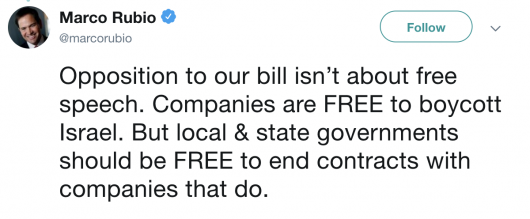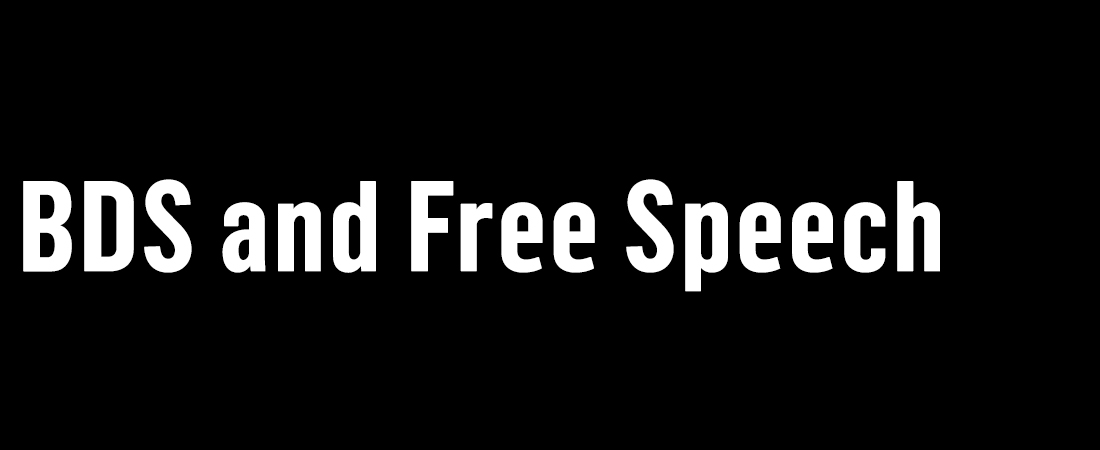While the US federal government shutdown continues, Senate Republicans introduced a bill that includes the “Combatting BDS Act.” Senate Democrats have opposed proceeding with any legislation that does not re-open the government, but this latest attempt to legislate how and what US citizens can protest merits a refresher on the Boycott Divestment Sanctions movement and its legislative backlash.
What is BDS?
BDS (Boycott Divestment Sanctions) campaigns against Israel use non-violent means to protest the Israeli government’s policies towards Palestinians and Arab citizens of Israel. In practice, individuals and companies refuse to do business with entities that accept Israeli government funding, which can range from businesses to universities to performers.
Combatting BDS Act
Dozens of state laws exist that compel state contractors or employees (including public school teachers) to promise not to boycott the Israeli government or Israeli-owned businesses as a condition of their employment or contract with the state. Federal courts have blocked enforcement of these state laws in Kansas and Arizona on the basis that they are unconstitutional. The Senate bill would express federal approval of state laws that place restrictions on boycotts of Israel and allow state and local governments to boycott companies participating in BDS.
The bill’s sponsor, Senator Marco Rubio, has argued that this is not a free speech issue, tweeting that “Companies are FREE to boycott Israel. But local & state governments should be FREE to end contracts with companies that do.”

But this is a fundamental misstatement of what and whom the First Amendment protects. It is precisely governments—local, state and federal—and government actors that are prohibited from restricting or interfering with the content of speech. The First Amendment protects individuals from government censorship, not the other way around. Governments are not protected by the First Amendment.
First Amendment Issues
Boycotts can be highly effective in delivering a message, and as such they have a respected place as political speech, from the colonial boycott of British goods to protest taxation without representation, to the bus boycotts in Montgomery, Alabama, in support of Rosa Parks after she refused to sit in the back of the bus, to the boycott against South Africa to oppose apartheid.
Whether one agrees with the positions taken by the BDS movement or not, individuals’ or businesses’ support for the boycotts are Constitutionally-protected political speech.
The US Supreme Court has clearly recognized that boycotts involve a range of expression protected by the First Amendment. In Claiborne, Mississippi, a boycott was organized against white merchants to create pressure for racial equality and integration. In NAACP v. Claiborne Hardware (1982), the Supreme Court held that a boycott “clearly involved constitutionally protected activity” in which First Amendment rights to “speech, assembly, association, and petition,” were exercised “to bring about political, social, and economic change.” Political boycotts, and other forms of speech, that are directed at issues of public concern are “on the highest rung of the hierarchy of First Amendment values.”
Government actors are also barred from withholding public contracts because of disagreement with a contractor’s political positions. In O’Hare Truck Svc. v. City of Northlake (1996), the Court held “if the government could deny a benefit to a person because of his constitutionally protected speech or associations, his exercise of those freedoms would in effect be penalized and inhibited. . . Such interference with constitutional rights is impermissible.”
Recent Anti-BDS Actions
A speech pathologist in Texas was asked to sign a contract addendum affirming that she would not boycott Israel during the term of her contract with the state. She refused. Her contract was not renewed. She had been with the school district for nine years and is now suing over violations of her freedom of speech.
At the University of Michigan, controversy arose after a professor declined to write a reference letter for a student intending to study abroad in Israel. He cited his political beliefs and practice of BDS as his reason. The university disciplined him, revoking his annual raise and cancelling his planned sabbatical. The American Association of University Professors, an organization which explicitly does not endorse BDS on the grounds that academic boycotts violate the principles of academic freedom, criticized the university’s response.
Civil rights activist Angela Davis was slated to receive an award from the Birmingham Civil Rights Institute, until it was withdrawn after BCRI received complaints about Davis’s outspoken support for BDS.
NCAC does not take a position on the political views of BDS or anti-BDS supporters. However, we strongly oppose efforts to stifle political expression.
Read more about how cultural boycotts chill free speech about Israel and Palestine.


